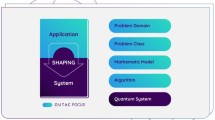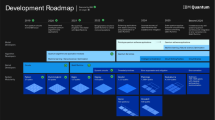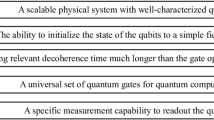Abstract
Quantum computers have been called the Ultimate Computer a decisive leap in technology with profound implications for the entire world. Quantum computers might usher in an entirely new age for the economy, society, and our way of life. It is an emerging field that leverages the principles of quantum mechanics to perform computations that are infeasible for classical computers. As quantum systems advance beyond early prototypes, it is critical to assess their capabilities compared to classical computers and artificial intelligence. This survey aims to provide a comprehensive, cross-sectional analysis of the current state of quantum computing, exploring its advantages over traditional computing paradigms and its potential societal impacts. It also goes through the various algorithms used in this paradigm and how they can aid in our needs. We conducted an extensive literature review of peer-reviewed articles and industry reports to gather data on quantum computing advancements, applications, and challenges. The survey examines quantum hardware platforms, algorithms, use cases across industries, and comparisons to classical and AI systems. Our findings indicate that quantum computers excel at specific tasks like optimization and simulation, offering exponential speedups over classical methods for certain problems. While not universally superior to AI or traditional computers, quantum systems enable new approaches to longstanding challenges in fields such as materials science, finance, and machine learning. However, significant technical hurdles remain before realizing large-scale, fault-tolerant quantum computers. Quantum computing represents a paradigm shift in computational power, with far-reaching implications across science, industry, and society. While challenges persist, continued advances in quantum technologies promise to unlock new realms of problem-solving capability beyond the reach of classical computers and AI systems. Strategic investment and interdisciplinary collaboration will be crucial to fully harness quantum computing’s transformative potential.


Similar content being viewed by others
Explore related subjects
Discover the latest articles, news and stories from top researchers in related subjects.Data Availability Statement
Not applicable.
References
Dyakonov M. Will we ever have a quantum computer? Berlin: Springer; 2020.
Bungum B, Selstø S. What do quantum computing students need to know about quantum physics? Eur J Phys. 2022;43(5): 055706.
Baritompa WP, Bulger DW, Wood GR. Grover’s quantum algorithm applied to global optimization. SIAM J Optim. 2005;15(4):1170–84.
Ray A. Quantum machine learning: algorithms and complexities. Compassionate AI. 2023;2(5):61–8.
Shuford J. Quantum computing and artificial intelligence: synergies and challenges. J Artif Intell Gen Sci JAIGS. 2024. https://doi.org/10.60087/jaigs.v1i1.35. (ISSN:3006-4023).
Kumar S, Simran S, Singh M. Quantum intelligence: merging AI and quantum computing for unprecedented power. In: 2024 international conference on trends in quantum computing and emerging business technologies, Pune, India. 2024. p. 1–7 https://doi.org/10.1109/TQCEBT59414.2024.10545163.
Chauhan V, Negi S, Jain D, Singh P, Sagar AK, Sharma AK. Quantum computers: a review on how quantum computing can boom AI. In: 2022 2nd international conference on advance computing and innovative technologies in engineering (ICACITE), Greater Noida, India. 2022. p. 559–63. https://doi.org/10.1109/ICACITE53722.2022.9823619.
Zhang C, Yang L. Study on artificial intelligence: the state of the art and future prospects. J Ind Inf Integr. 2021;23: 100224 (ISSN 2452-414X).
Ayoade O, Rivas P, Orduz J. Artificial intelligence computing at the quantum level. Data. 2022;7(3):28. https://doi.org/10.3390/data7030028.
Krenn M, Landgraf J, Foesel T, Marquardt F. Artificial intelligence and machine learning for quantum technologies. Phys Rev A. 2023;107: 010101 (American Physical Society).
Mangini S, Tacchino F, Gerace D, Bajoni D, Macchiavello C. Quantum computing models for artificial neural networks. Europhys Lett. 2021;134(1):10002.
Tian J, et al. Recent advances for quantum neural networks in generative learning. IEEE Trans Pattern Anal Mach Intell. 2023;45(10):12321–40. https://doi.org/10.1109/TPAMI.2023.3272029.
Pise S, Agarkar AA, Jain S. Unleashing the power of generative AI and quantum computing for mutual advancements. In: 2023 3rd Asian conference on innovation in technology (ASIANCON), Ravet IN, India. 2023. p. 1–7. https://doi.org/10.1109/ASIANCON58793.2023.10270193.
Fastovets DV, Bogdanov YI, Bantysh BI, Lukichev VF. Machine learning methods in quantum computing theory. In: International conference on micro-and nano-electronics 2018, vol. 11022. SPIE; 2019. p. 752–61.
Padmanaban H. Quantum computing and AI in the cloud. J Comput Intell Robot. 2024;4(1):14–32.
Jiang W, Xiong J, Shi Y. When machine learning meets quantum computers: a case study. In: Proceedings of the 26th Asia and south pacific design automation conference. 2021. p. 593–8.
MacQuarrie ER, Simon C, Simmons S, Maine E. The emerging commercial landscape of quantum computing. Nat Rev Phys. 2020;2(11):596–8.
Bova F, Goldfarb A, Melko RG. Commercial applications of quantum computing. EPJ Quantum Technol. 2021;8(1):2.
Bayerstadler A, Becquin G, Binder J, Botter T, Ehm H, Ehmer T, Erdmann M, et al. Industry quantum computing applications. EPJ Quantum Technol. 2021;8(1):25.
Kirsch Z, Chow M. Quantum computing: the risk to existing encryption methods. 2015. Retrieved from http://www.cs.tufts.edu/comp/116/archive/fall2015/zkirsch.pdf.
Jadhav A, Rasool A, Gyanchandani M. Quantum machine learning: scope for real-world problems. Procedia Comput Sci. 2023;218:2612–25.
Leon D, Nathalie P, Itoh KM, Kim D, Mehta KK, Northup TE, Hanhee Paik BS, Palmer NS, Sangtawesin S, Steuerman DW. Materials challenges and opportunities for quantum computing hardware. Science. 2021;372(6539):eabb2823.
Rieffel E, Polak W. An introduction to quantum computing for non-physicists. ACM Comput Surv CSUR. 2000;32(3):300–35.
Ugwuishiwu CH, Orji UE, Ugwu CI, Asogwa CN. An overview of quantum cryptography and shor’s algorithm. Int J Adv Trends Comput Sci Eng. 2020;9(5).
Yang Z, Zolanvari M, Jain R. A survey of important issues in quantum computing and communications. IEEE Commun Surv Tutor. 2023;25(2):1059–94. https://doi.org/10.1109/COMST.2023.3254481.
Caleffi M, Amoretti M, Ferrari D, Cuomo D, Illiano J, Manzalini A, Cacciapuoti AS. Distributed quantum computing: a survey. 2022. arXiv preprint arXiv:2212.10609.
Dunjko V, Briegel HJ. Machine learning & artificial intelligence in the quantum domain: A review of recent progress. Rep Prog Phys. 2018;81: 074001.
Bhalla A, Kenneth E, Matthew H. Quantum computing, shor’s algorithm, and parallelism. Accessed 23 Aug 2019.
Melnikov A, Kordzanganeh M, Alodjants A, Lee RK. Quantum machine learning: from physics to software engineering. Adv Phys X. 2023. https://doi.org/10.1080/23746149.2023.2165452.
Funding
Not applicable.
Author information
Authors and Affiliations
Contributions
TN: Conceptualization, Writing-original draft; BKD: Conceptualization, Writing-original draft; BNL: Conceptualization.
Corresponding author
Ethics declarations
Conflict of interest
The authors declare that they have no known competing financial intrests or personal relationships that could have appeared to influence the work reported in this paper
Research Involving Human and/or Animals
Not applicable.
Informed Consent
Not applicable.
Additional information
Publisher's Note
Springer Nature remains neutral with regard to jurisdictional claims in published maps and institutional affiliations.
Rights and permissions
Springer Nature or its licensor (e.g. a society or other partner) holds exclusive rights to this article under a publishing agreement with the author(s) or other rightsholder(s); author self-archiving of the accepted manuscript version of this article is solely governed by the terms of such publishing agreement and applicable law.
About this article
Cite this article
Nanda, T., Dhanalakshmi, B.K. & Lakshmi, B.N. An Explorative Cross Sectional Comprehensive Survey on Quantum Computing. SN COMPUT. SCI. 5, 1130 (2024). https://doi.org/10.1007/s42979-024-03505-w
Received:
Accepted:
Published:
DOI: https://doi.org/10.1007/s42979-024-03505-w




